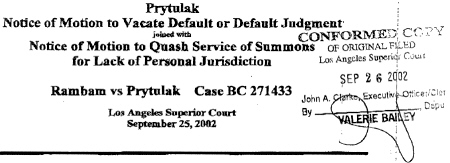
 | |
|
Steven Rambam, Plaintiff, vs. Lubomyr Prytulak, Defendant.
|
) ) ) ) ) ) ) ) ) ) ) ) |
Superior Court Case No. BC 271433
MOTION TO VACATE DEFAULT OR DEFAULT JUDGMENT
[Not a general appearance CCP �418.10]
|
| 01][02 |
| 02][03 |
|
Registrant: Pallorium, Inc. (PALLORIUM-DOM) P. O. Box 155 � Midwood Station Brooklyn, NY 11230 US Domain Name: PALLORIUM.COM Administrative Contact: Rambam, Steven (SR4774) [email protected] Pallorium, Inc. P. O. Box 155 � Midwood Station Brooklyn, NY 11230 US ( http://www.netsol.com/cgi-bin/whois/whois?ha+PALLORIUM-DOM&id;=0 ) |
|
Lubomyr Prytulak [Address] [Telephone] [Email] |
|
CCP �418.10. (a) A defendant, on or before the last day of his or her time to plead or within any further time that the court may for good cause allow, may serve and file a notice of motion for one or more of the following purposes: (1) To quash service of summons on the ground of lack of jurisdiction of the court over him or her. |
| CCP �403.020. (a) If a plaintiff [...] files an amended complaint or other amended initial pleading that changes the jurisdictional classification from limited to unlimited, the party at the time of filing the pleading shall pay the reclassification fee provided in 05][06 Section 403.060, and the clerk shall promptly reclassify the case. |
|
CCP �403.070. (a) An action or proceeding that is reclassified shall be deemed to have been commenced at the time the complaint or petition was initially filed, not at the time of reclassification. (b) The court shall have and exercise over the reclassified action or proceeding the same authority as if the action or proceeding had been originally commenced as reclassified, all prior proceedings being saved. |
| If a defendant has sufficient extensive 'contacts' with the forum state, it may be subject to suit there on all claims wherever they arise [i.e., general jurisdiction].... [In] other cases, the jurisdictional sufficiency of the defendant's contacts depends on an assessment of the 'relationship among the defendants, the forum, and the litigation [i.e., specific jurisdiction]'. (Sammons Enterprises, Inc. v. Superior Court (1988) 205 Cal.App.3d 07][08 1427, 1432) |
| Where a non-resident defendant's activities in the forum are not so pervasive as to justify the exercise of general jurisdiction over him, then jurisdiction depends upon the quality and nature of his activity in the forum in relation to the particular cause of action.... Thus, as the relationship of the defendant with the state seeking to exercise jurisdiction over him grows more tenuous, the scope of jurisdiction also retracts and fairness is assured by limiting the circumstances under which the plaintiff can compel him to appear and defend. (Brown v. Watson (1989) 207 Cal.App.3d 1306, 1312-1313) |
| Thus, specific jurisdiction is determined under a three-part test: "(1) The nonresident defendant must do some act or consummate some transaction with the forum or perform some act by which he purposefully avails himself of the privilege of conducting activities in the forum, thereby invoking the benefits and protections of its laws; (2) the claim must be one which arises out of or results from the defendant's forum-related activities; and (3) exercise of jurisdiction must be reasonable." (JDO v. Superior Court, supra, 7-8, citing Panavision International., L.P. v. Toeppen (9th Cir. 1998) 141 F.3d 1316, 1320.) |
| [T]he likelihood that personal jurisdiction can be constitutionally exercised is directly proportionate to the nature and quality of commercial activity that an entity conducts over the Internet. This sliding scale is consistent with well developed personal jurisdiction principles. At one end of the spectrum are situations where a defendant clearly does business over the Internet. If the defendant enters into 09][10 contracts with residents of a foreign jurisdiction that involve the knowing and repeated transmission of computer files over the Internet, personal jurisdiction is proper. [Citation.] At the opposite end are situations where a defendant has simply posted information on an Internet Web site which is accessible to users in foreign jurisdictions. A passive Web site that does little more than make information available to those who are interested in it is not grounds for the exercise of personal jurisdiction. (JDO v. Superior Court, supra, at 15) |
| Defendants' conduct of contracting, via computer, with Internet service providers, which may be California corporations or which may maintain offices or databases in California, is insufficient to constitute "purposeful availment" and does not satisfy the first prong of the three-part test for specific jurisdiction. (JDO v. Superior Court, supra, at 17) |
| The interest of the state in providing a forum for its residents or in regulating the business involved...; the relative availability of the evidence and the burden of defense and prosecution in one place rather than another...; the ease of access to an alternative forum...; the avoidance of multiplicity of suits and conflicting adjudications...; and the extent to which the cause of action arose out of defendant's local activities.... (Fisher Governor Co. v. Superior Court, (1959) 53 Cal.2d 222, 225-26) |
| CCP �418.10 (b) The notice shall designate, as the time for making the motion, a date not more than 30 days after filing of the notice. The notice shall be served in the same manner, and at the same times, prescribed by subdivision (b) of Section 1005. |
| CCP �1005. (b) [...] all moving and supporting papers shall be served and filed at least 21 calendar days before the hearing. [...] However, if the notice is served by [...] overnight delivery, the required 21-day period of notice before the hearing shall be increased by two calendar days. |
DATED: 25 September 2002 |
By: Lubomyr Prytulak Defendant |
| 12][13 |
Calder v. Jones, 465 U.S. 783 (1984) 7STATE CASESCybersell, Inc. v. Cybersell, Inc, 130 F.3d 414 (9th Cir. 1997) 8
Hanson v. Denckla, 357 U.S. 235 (1958) 6
Helicopteros Nacionales de Columbia v. Hall, 466 U.S. 408 (1984) 4,7
Burger King v. Rudzewicz, 471 U.S. 462 (1985) 6,7
Panavision Intern., L.P. v. Toeppen, 141 F.3d 1316 (9th Cir. 1998) 6
Pennoyer v. Neff, 95 U.S. 714 (1877) 3
Perkins v. Benguet Mining Consolidated Mining Co., 342 U.S. 437 (1952) 5,9
World-Wide Volkswagen Corp. v. Woodson, 444 U.S. 286 (1980) 4
Brown v. Watson (1989), 207 Cal. App. 3d 1306 4,6Cornelison v. Chaney, (1976), 16 Cal. 3d 143 6
Felix v. Bomoro Kommanditgesellschaft (1987), 196 Cal. App. 3d 106 4
Fisher Governor Co. v. Superior Court, (1959), 53 Cal. 2d 222 9
Floveyor Int. Ltd v. Superior Court (1997), 59 Cal. App. 4th 789 4
Jewish Defense Organization Inc. v. Superior Court of Los Angeles (1999) http://caselaw.lp.findlaw.com/data2/californiastatecases/b129319.pdf
KLM v. Superior Court, (1951), 107 Cal. App. 2d 495 5
Sammons Enterprises, Inc. v. Superior Court (1988), 205 Cal. App. 3d 1427 5
Secrest Machine Corp. v. Superior Court (1983), 33 Cal. 3d 664 5
Sibley v. Superior Court, (1976), 16 Cal. 3d 442 6
| 13][14 |
| CCP �1016.6 (d) The copy of the notice or other paper served by Express Mail or another means of delivery providing for overnight delivery pursuant to this chapter shall bear a notation of the date and place of deposit or be accompanied by an unsigned copy of the affidavit or certificate of deposit. |
| 15][16 |

| 16][17 |
|
ATTORNEY OR PARTY WITHOUT ATTORNEY (Name and address):
TELEPHONE NO.:
Defendant without attorney is: Lubomyr Prytulak [Telephone] [Address] |
FOR COURT USE ONLY |
|
NAME OF COURT: Los Angeles Superior Court 111 North Hill Street Los Angeles, California USA 90012 |
|
PLAINTIFF/PETITIONER: Steven Rambam DEFENDANT/RESPONDENT: Lubomyr Prytulak |
|
| DECLARATION |
CASE NUMBER
BC271433 |